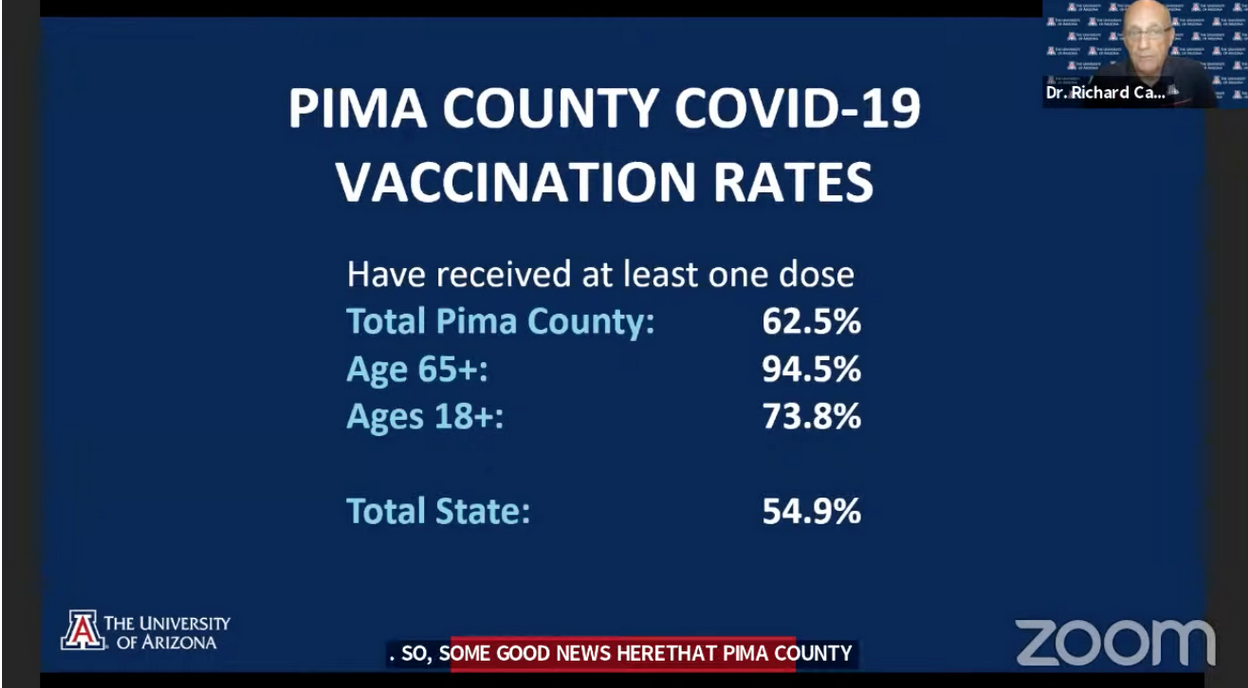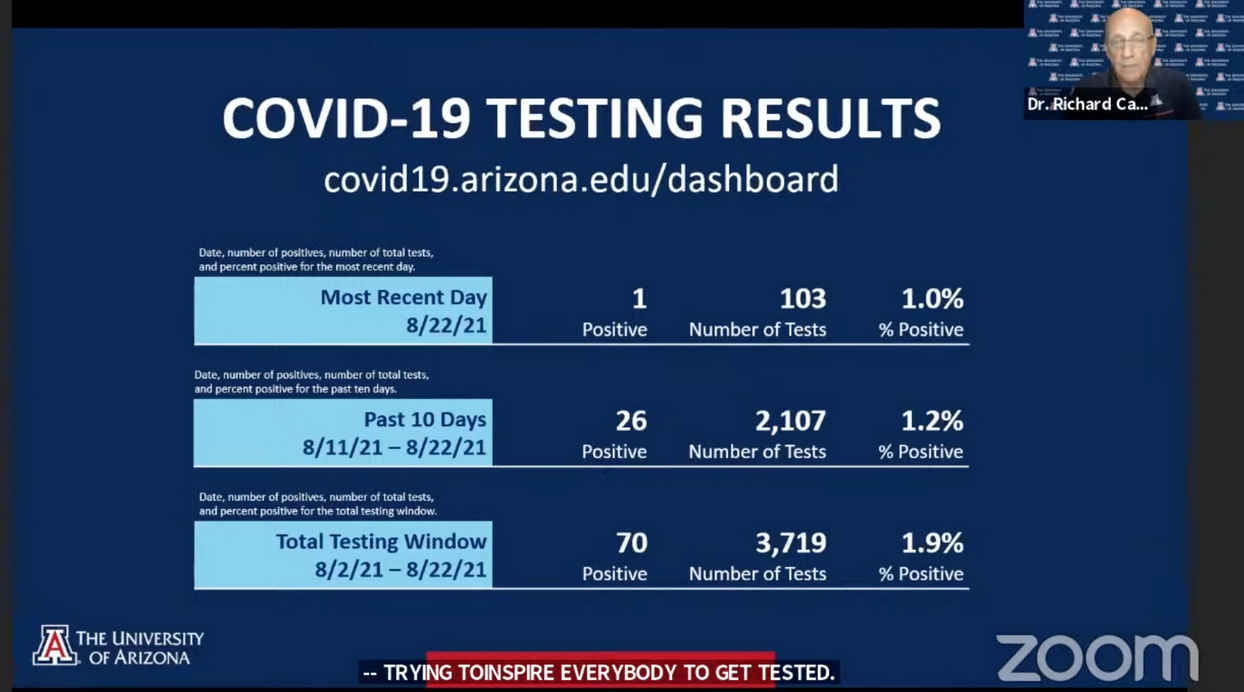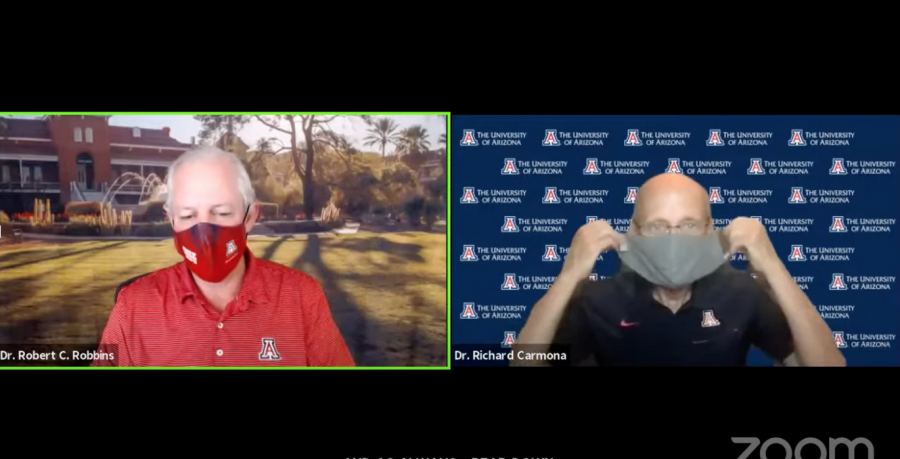On the first day of the new semester, the University of Arizona’s reentry task force met to discuss their plans to mitigate the spread of COVID-19 as the school year begins.
University President Dr. Robert C. Robbins began by reiterating the university’s approach to minimizing the spread of COVID-19 on campus and in the community. This approach involves mask mandates in indoor spaces where social distancing is not possible, recommended regular testing and vaccination.
According to Robbins, a recent advisory from the Pima County Health Department warned that hospitals are experiencing a high rate of people coming into hospitals with non-COVID-19 related illnesses. Because of this, Robbins emphasized the need to minimize COVID-19 spread to keep sufficient beds available.
Robbins proceeded to clarify how the recent mask mandate enforced by the university relates to state law and Gov. Doug Ducey’s executive order — a point of confusion from last week’s meeting.
“We’re not differentiating between vaccinated and unvaccinated individuals,” Robbins said. “By requiring masks be worn by all students and employees in indoor settings where adequate and continuous social distance is not possible, we are consistent with existing state law.”
Robbins also encouraged students to upload their vaccine cards. According to Robbins, only 48% of students have uploaded their card. However, citing results from recent surveys, he suspected that the actual percentage of vaccinated students is much higher. Robbins reported on a survey from February that found that 83% of students said they planned to get the vaccine as soon as it is available to them. He also cited a later survey in April that found 82% of students reported getting at least one dose of the vaccine.

Next, Dr. Richard Carmona presented on the statistics from testing at the university and cases at the county and state levels. Arizona is ranked 21 in the nation for daily new cases per 100,000 with higher ranked states corresponding to a higher case number. Carmona also reported on the vaccination rate, with the state having a vaccination rate of 54.9%, a value consistent with national numbers.
“The fact is almost half of our country is still vulnerable,” Carmona said. “And as they continue, and people don’t get vaccinated, it gives that virus more places to go, more places to mutate, to be able to generate more variants and to make it much more problematic for the rest of the country because it will prolong this pandemic.”
According to Carmona, incentives remain in place to encourage university students and employees to get vaccinated. He was hopeful that these incentives will encourage hesitant students to get vaccinated. Robbins also expressed his hopes that the Pfizer vaccine’s recent FDA approval will also help to combat vaccine hesitancy.
While Robbins confirmed there are no current plans to reinstate the vaccine Point of Distribution and will not return this semester, he emphasized that the Pfizer vaccine is available at Campus Health.

Carmona also reported on the daily testing results collected by the university, which continue to reflect a low number of tests being administered. 103 tests were given on Aug. 22, a number Robbins said he hoped to grow to a rate of 2,000 administered tests daily — consistent with where the numbers were last year.
The meeting then transitioned into a question and answer session. Many questions centered on Pfizer’s recent approval by the FDA, inquiring if this would make it easier to mandate the vaccine. Robbins responded that due to state law, vaccine mandates would be difficult to implement.
“Given where we are politically in the state, I think that’s a heavy lift to get mandated vaccines,” Robbins said.
Another question from local media asked Robbins about how the university will determine if the spread of COVID-19 is severe enough to warrant stronger mitigation efforts such as a switch to virtual learning. Robbins responded that isolation dorm capacity, as well as the ICU bed capacity in Pima County will be key indicators.
Carmona concluded by encouraging safety precautions as students return to campus and the snowbird population in Arizona rises. Robbins said he expected to see a peak in cases within the first month of classes similar to last year. However, Carmona and Robbins remained hopeful that through proper safety measures, vaccination, testing and masking, transmissibility in the campus community can stay low.
“You know, we’re hoping for the best scenario that our youngsters come back, our students and faculty come back, transmissibility stays low, we stay open, businesses stay open, economy does well and we start to extinguish this virus in the community,” Carmona said. “But we’re prepared to surge as necessary to deal with the threat as it evolves.”
Follow Hillary Schiff on Twitter









